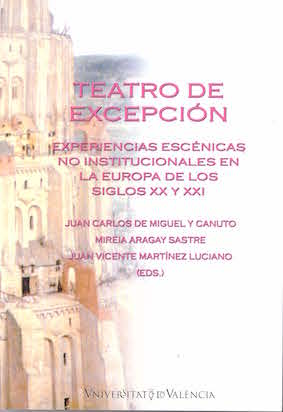Quando i letteratti italiani promuovono ad “eccezione” il teatro (Pirandello, i futuristi, Pasolini, Testori, Maraini)
DOI:
https://doi.org/10.7203/qf-elit.v19i0.5210 Resumen
Resumen
E’ storiograficamente interessante analizzare in quali modi nel Novecento italiano i “letterati” sono riusciti, a volte in misura importante se non decisiva, a promuovere (non a ridurre), ad eccezione l’attività teatrale conducendola ai confini (se non oltre) del sistema teatrale dominante, anche sul piano del valore qualitativo artistico, tramite invenzioni. Nel teatro italiano degli ultimi cent’anni circa, le eccezioni, con relative invenzioni, possono essere state sprecate, pur lasciando dei semi pronti a rinascere su nuovi terreni; a volte si sono concretizzate transformandosi in pensiero teatrale; facendosi “teatri-in-forma-di-libro” (Ferdinando Taviani); nascondendo il teatro “irregolare” nella drammaturgia letteraria scritta. Appunto, l’apporto dei letterati, sostenuto dal loro sguardo eccentrico, da extraterritoriali: è questo il versante che mi propongo di esplorare, convinto che capendo l’azione di chi ci ha preceduto, potremo meglio comprendere e agire, per oggi e per domani. In particolare è all’incirca nei due decenni 1915-1925 e 1965-1975 che alcune personalità provenienti dal mondo della letteratura, del libro, hanno saputo offrire nuove idee ad un sistema teatrale quasi immobile.
Parole chiave: Pirandello; teatro futurista; Testori; Pasolini; D. Maraini.
 Descargas
Descargas
Descargas
Publicado
Cómo citar
-
Resumen370
-
PDF186
Número
Sección
Licencia

Este obra está bajo una licencia de Creative Commons Reconocimiento-NoComercial-SinObraDerivada 4.0 Internacional.
Los autores que publican en esta revista están de acuerdo con los siguientes términos:
- Los autores conservan los derechos de autor y garantizan a la revista el derecho de ser la primera publicación del trabajo al igual que licenciado bajo una Creative Commons Attribution License que permite a otros compartir el trabajo con un reconocimiento de la autoría del trabajo y la publicación inicial en esta revista.
- Los autores pueden establecer por separado acuerdos adicionales para la distribución no exclusiva de la versión de la obra publicada en la revista (por ejemplo, situarlo en un repositorio institucional o publicarlo en un libro), con un reconocimiento de su publicación inicial en esta revista.
- Se permite y se anima a los autores a difundir sus trabajos electrónicamente (por ejemplo, en repositorios institucionales o en su propio sitio web) antes y durante el proceso de envío, ya que puede dar lugar a intercambios productivos, así como a una citación más temprana y mayor de los trabajos publicados (Véase The Effect of Open Access) (en inglés).




